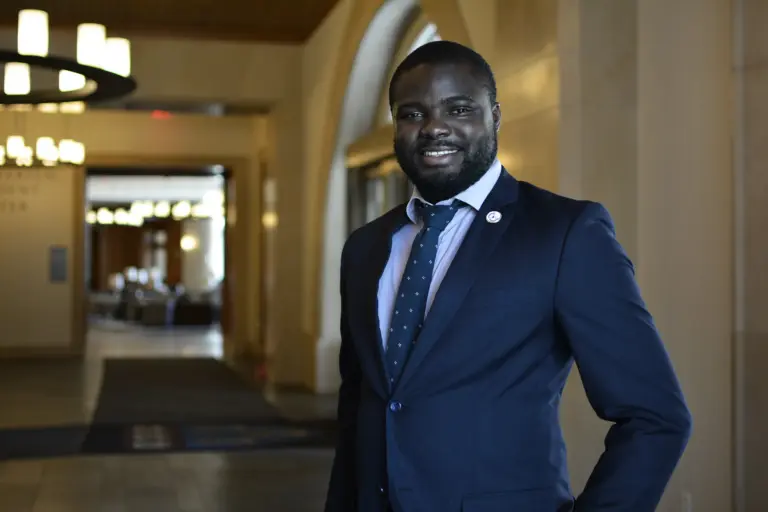In Africa’s startup story, Iyin Aboyeji has always stood apart — not just for the companies he built, but for the philosophy that shaped them. To him, success is less about the size of your funding round and more about the courage to believe in what isn’t yet visible.
Long before “tech ecosystem” became a buzzword, Aboyeji was already exploring how belief — in people, purpose, and possibility — could power sustainable growth. His work with Andela turned unemployment into export. Flutterwave transformed fragmented payment systems into opportunity. Now, through Future Africa, he’s betting on founders who see constraint not as a ceiling but as raw material for innovation.
“Building in Africa is a test of conviction,” Aboyeji says. “You must believe past what you can measure.”
Building Beyond the 6%
Aboyeji’s thesis is blunt: African founders have spent too long building for the elite few — the “six per cent” who already live close to global privilege. The real transformation, he insists, will come from designing for the 94%.
That shift demands a different mindset — one that rethinks affordability, access, and experience from scratch. “When you stop chasing the six per cent,” he says, “you begin to see the scale hidden in the rest of the continent.”
It’s not idealism; it’s economics. In a market where millions transact daily outside formal systems, relevance is born from empathy and precision. The future, Aboyeji argues, belongs to founders who build products that help ordinary people survive first — because survival always precedes scale.
Survival as a Strategy
For Aboyeji, the word “survival” is not defeatist — it’s foundational. “Failure is the default,” he says. “Every day is a disciplined attempt to delay it.”
That discipline, he believes, rests on three habits:
-
Radical customer intimacy: understanding users so deeply that you anticipate their next decision.
-
Capital humility: treating money as oxygen, not fireworks.
-
Optionality: building multiple paths to stay alive.
These principles aren’t glamorous. But they are what separate hype-driven ventures from enduring companies. “If you stay alive long enough,” he smiles, “the world eventually calls you brilliant.”
Faith as Framework
Aboyeji often credits faith as the anchor that keeps his decisions grounded when logic fails. His departure from Andela after global recognition wasn’t strategy — it was obedience to conviction. That leap of faith led to Flutterwave, which achieved unicorn status faster than his previous company.
“Faith doesn’t remove uncertainty,” he says. “It teaches you how to walk through it.”
In a continent where infrastructure gaps, policy confusion, and volatility test every founder’s patience, belief — not just in God, but in vision — becomes an operational advantage. “You cannot build here without believing beyond what’s visible,” he says.
Investing for the Next Frontier
Today, through Future Africa, Aboyeji channels that belief into capital. But he insists money is the least important part. “We don’t fund startups; we back survival machines,” he says. “Capital doesn’t create value — customers do. Our job is to help founders stay alive long enough to find them.”
The platform has evolved from a community of angel investors into a disciplined network supporting ventures across the continent. His approach? Bring structure, network, and accountability — not just cheques.
“Entrepreneurship here is not about escaping risk,” he says. “It’s about learning how to live with it better than anyone else.”
Beyond the Founder Ego
Aboyeji’s most provocative belief is that great companies must outlive their creators. “If a business collapses when a person leaves, it wasn’t a business — it was a project,” he says.
That philosophy shapes how he mentors founders: by forcing them to separate self from mission. “You must love your mission more than your ego,” he says. “If someone else could solve the problem and you’d still be proud, then you’re building something that can last.”
The New Age of Efficiency
Africa’s tech ecosystem has entered what Aboyeji calls the “efficiency era” — a season where capital is scarce, automation is rising, and only disciplined builders thrive. “The days of growth at all costs are over,” he says. “Now it’s about creating real value with fewer resources.”
But scarcity, in his view, is an advantage. “When you learn to win under constraint,” he says, “you can compete anywhere.”
Aboyeji’s outlook for the next decade is pragmatic yet hopeful. “We are building muscles that the world will soon need — resilience, resourcefulness, and creativity born from necessity. Those who master these will define the next wave of global innovation.”
Redefining Legacy
For Iyin Aboyeji, legacy isn’t about valuation or visibility — it’s about contribution. His journey through Andela, Flutterwave, and Future Africa reveals one consistent thread: a refusal to let fear define what’s possible.
He sums it up in a single line:
“You don’t need everything to be certain before you begin. You just need to begin — with faith, with purpose, and with discipline.”

